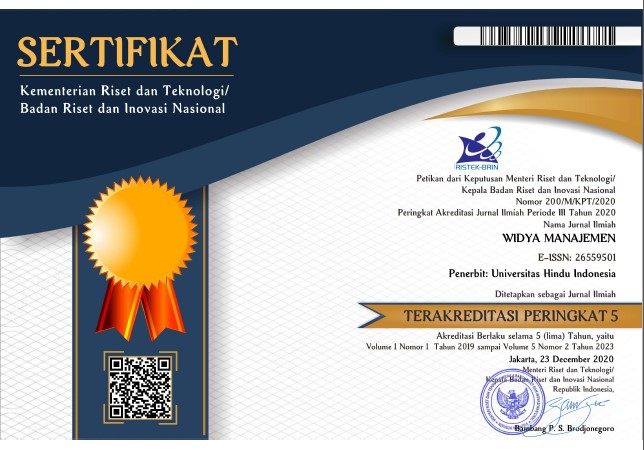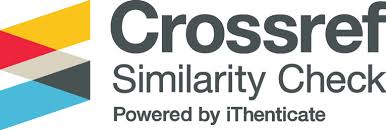Peran Efektifitas Komunikasi Organisasi dalam Meningkatkan Motivasi Kerja Karyawan
Abstract
The purpose of this study is to see the similarity between the effectiveness of communication within the organization on employee motivation and the overall impact on employee performance. This study focuses on the fact that communication in the workplace can take many forms and has long-term effects on employee motivation, especially in the relationships between people in the organization. The method used in this study is a descriptive qualitative method with data collection techniques through literature studies using books, literature, scientific articles, or library materials. The results of the study show that the effectiveness of organizational communication is carried out through several stages which have a significant influence on employee motivation. The conclusion of the research is that a leader pays attention to important communication in the organization and minimizes the obstacles that occur so that communication goals and organizational goals can be achieved by increasing employee performance through work motivation.
References
Agus Budi Yulianto, Nengah Bawa Atmadja, & Made Yudana. (2014). Kontribusi Komunikasi Interpersonal kepala sekolah, Budaya Organisasi dan Etos Kerja Terhadap Motivasi Kerja Guru. E Journal Program Pascasarjana Universitas Pendidikan Ganesha Program Studi Administrasi Pendidikan, 5.
Asamu Festus Femi. (2014). The Impact of Communication on Workers’ Performance in Selected Organisations in Lagos State, Nigeria. IOSR Journal Of Humanities And Social Science (IOSR-JHSS), 19(8), 75–82.
Aworemi, J. R., Abdul-Azeez, I. A., & Durowoju, S. T. (2011). An Empirical Study of the Motivational Factors of Employees in Nigeria . International Journal of Economics and Finance, 3(5), 227–233.
Choerul Anwar. (2015). Manajemen Konflik untuk Menciptakan Komunikasi yang Efektif (Studi Kasus Di Departemen Purchasing PT. Sumi Rubber Indonesia). Interaksi: Jurnal Ilmu Komunikasi, , 4(2), 148–157.
Claire Katunge Mutuku, & Petronilla Mathooko. (2014). Effects of organizational communication on employee motivation: A case study of Nokia Siemens Networks Kenya. International Academic Journal of Information Sciences and Project Management (IAJISPM), 1(3), 28–62.
Craig C. Pinder. (2015). Work Motivation in Organizational Behavior (2nd Edition). Psychology Press.
Dina Artika Lubis. (2006). Hubungan antara Efektifitas Komunikasi Antarpribadi dengan Motivasi Kerja Karywan . Jurnal Komunikologi , 3(2), 71–86.
Effendy Onong Uchyana. (2002). Ilmu Komunikasi, teori dan praktek. Bandung. Remaja Rosda Karya.
Fred Luthan. (2006). Perilaku Organisasi (Edisi 10). Andi.
Gheorghe Pistol, Gardan Daniel, & Geangu Petronela. (2009). The Importance of Managerial Communication in Establishing The Company Marketing Communication. The International Conference on Administration and Business, 316–322.
Hassa Nurrohim, & Lina Anatan. (2009). Efektifitas Komunikasi dalam Organisasi. Jurnal Manajemen, 7(4), 1–9.
Herman. (2020). Perilaku Komunikasi Kepala Sekolah dalam Peningkatan Kinerja Guru. Idarah (Jurnal Pendidikan Dan Kependidikan), 4(1), 59–72.
Justinus Benni Indrianto. (2021, April 19). Pentingnya Komunikasi Efektif di dalam Suatu Organisasi. KPKNL Pangkalan Bun
Kirti Rajhans. (2009). Effective Organizational Communication: a Key to Employee Motivation and Performance. . Interscience Management Review (IMR) , 2(2), 145–149.
Maulana Rezi Ramadhana, & Ratih Hasanah Sudrajat. (2020). Pelatihan Komunikasi Efektif dalam meningkatkan Pelayanan Prima di Instansi Pemerintahan Provinsi Jawa Barat. Jurnal Pengabdian Kepada Masyarakat, 4(4), 693–700.
Mery Meilita, & Yudi Perbawaningsih. (2014). Pengaruh Iklim Komunikasi Organisasi dan Kepuasan Kerja Karyawan Terhadap Motivasi Kerja Karyawan (Studi Kasus Pada Karyawan Bagian Transaksi Energi PT. PLN (Persero) Wilayah Kalimantan Barat Area Sanggau). E-Journal Ilmu Komunikasi Universitas Atma Jaya Yogyakarta, 1(4), 1–14.
Moh Ainur Rahman, & Arik Prasetya. (2018). Pengaruh Kepemimpinan dan Komunikasi Organisasi terhadap Kinerja Karyawan (Studi pada Karyawan PT. Jatim Times Network di Kota Malang). Jurnal Administrasi Bisnis (JAB), 63(1), 82–89.
Renya Rosari, Pandu Adi Cakranegara, Irsyad Kamal, & Chitra Indah Sari. (2022). Strategi Manajemen Sumber Daya Manusia dalam Pengelolaan Keuangan BUMDES di Era Digitalisasi. Owner : Riset Dan Jurnal Akuntansi, 6(3), 3040–3049.
Sari Ramadanty, & Handy Martinus. (2016). Organizational communication: Communication and motivation in the workplace. Humaniora, 7(1), 77–86.
SQ Badu, & N Djafri. (2017). Kepemimpinan dan perilaku organisasi. Ideas Publishing.
Suryani NK, & FoEh John EHJ. (2019). Manajemen Sumber Daya Manusia, Tinjauan Praktis Aplikatif. Nilacakra Publisher.
Suryani NK, Sugianingrat I.A.P.W., & Laksemini K.D.I.S. (2020). Kinerja Sumber Daya Manusia, Teori. Aplikasi dan Penelitian. Nilacakra Publisher.
Yopines Ansen, & Edwin Norman. (2016). Hambatan Komunikasi Dan Budaya Guna Meningkatkan Produktivitas Kerja. Jurnal Study and Management Research, 13(3), 28–36.
Zaenal Mukarom. (2020). Teori-Teori Komunikasi. UIN Sunan Gunung Djati .
Reproduction Policy
Every author submitting articles to Widya Manajemen must make a statement that the manuscript is free from plagiarism and is not being considered and published in other journals.
Articles that have been published are copyrighted by the Program Studi Manajemen FEBP UNHI. For educational purposes, the contents of the article may be duplicated or reproduced as long as the source of the article is mentioned. Written requests must be submitted to the editor to obtain permission to republish the contents of the article for purposes other than educational purposes.
-----------------------------------------------------------------------------------------------------
Kebijakan Reproduksi
Setiap penulis yang menyerahkan artikel ke Widya Manajemen harus membuat surat pernyataan bahwa naskahnya bebas dari plagiarisme dan tidak sedang dipertimbangkan dan dimuat dalam jurnal lain.
Artikel yang telah dipublikasi menjadi hak cipta Program Studi Manajemen FEBP UNHI. Untuk tujuan edukatif, isi dari artikel dapat digandakan atau direpublikasi selama menyebutkan sumber dari artikel tersebut. Permintaan tertulis harus diajukan kepada editor untuk memperoleh ijin merepublikasi isi dari artikel untuk tujuan lainnya selain tujuan edukatif.






.jpg)









